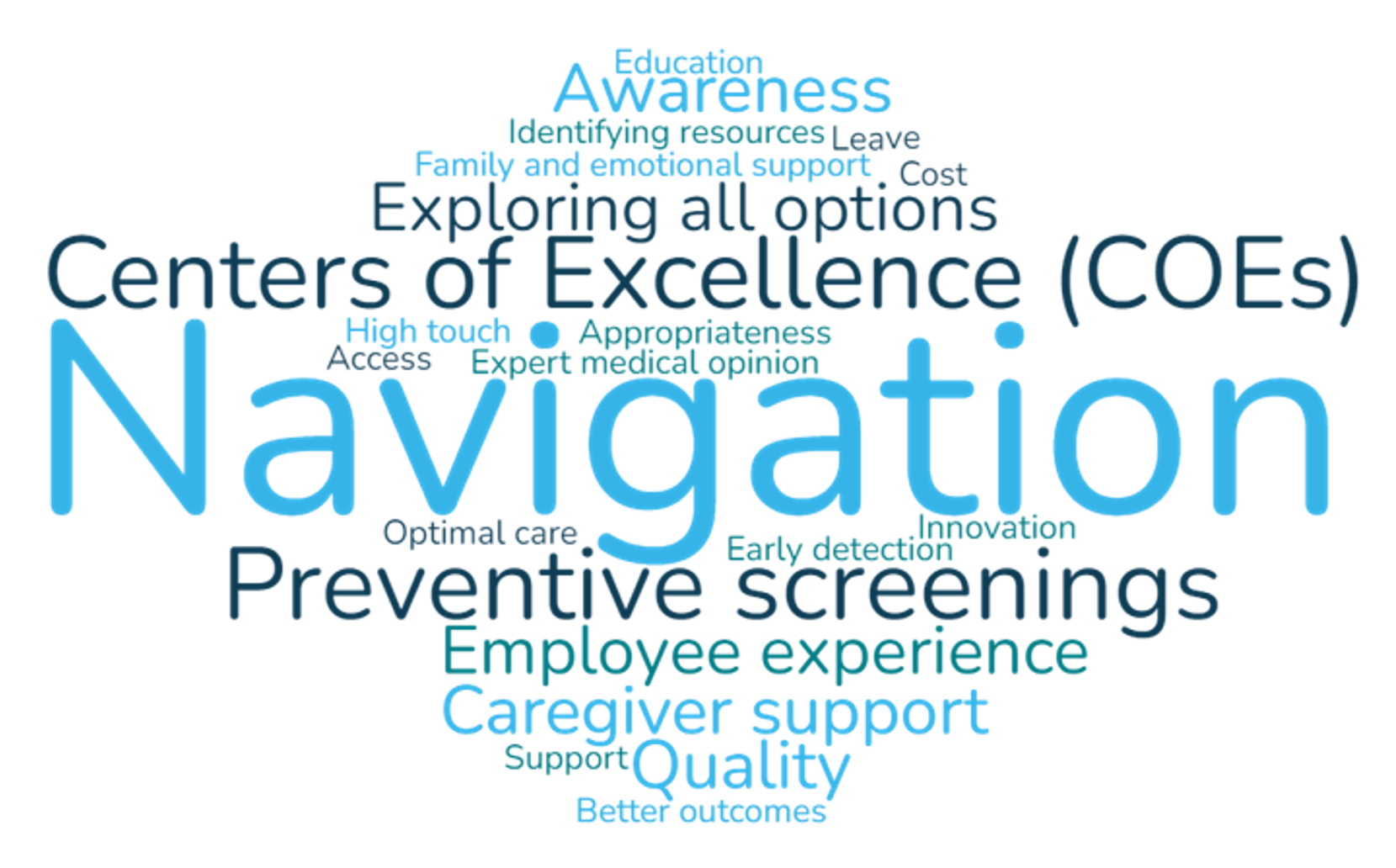December 05, 2023
Findings from the Business Group’s 2024 Large Employer Health Care Strategy Survey show that, for a second year in a row, cancer is the #1 cost driver for self-insured employers – and employers anticipate a higher prevalence of late-stage cancers due to delayed care and missed screenings during and after the pandemic. Employers are prioritizing their cancer-related benefit strategies and programs to determine what offerings are impactful and where progress is still needed.
The following provides a summary of themes discussed during the call.
 Navigation is a central component
of cancer care strategy for employers.
Navigation is a central component
of cancer care strategy for employers.
Employers emphasized the importance of supporting employees, as patients or caregivers, in navigating the complex landscape of cancer care. Many highlighted cancer care navigation, combined with high-touch support and educational initiatives, as their key area of focus (see Figure 1 below for other described focus areas). For example, one employer stressed the need for navigation services that are personalized and address the unique needs of each patient, such as coordinating leave from work during treatment.

To remove barriers to access to highly specialized services for patients with complex cancers, several employers are partnering with vendors that focus on directing patients to high-quality care like Centers of Excellence, which provide integrated cancer care options and can offer access to the most innovative treatments.
 Employers are examining existing cancer
screening strategies and preventive health programs to enhance care for employees.
Employers are examining existing cancer
screening strategies and preventive health programs to enhance care for employees.
Employers underscored the necessity of continued focus on promoting preventive screenings, recognizing that early detection can lead to better outcomes. If genetic testing is offered, it’s important for patients to also have access to genetic counselors to help them understand the results and utilize available resources more effectively. Moreover, employers are promoting preventive cancer screenings and driving increased utilization through coverage of less invasive screenings, such as home screening kits for colon cancer. However, some employers noted decreased engagement with these initiatives in recent years, with one calling it an example of “benefit strategy colliding with human behavior change.” One employer who offers incentives for getting cancer screenings saw an increase in utilization after implementing the reward.
One employer pointed out the important distinction between screening for cancer and preventing cancer, noting that the two strategies are not necessarily the same. In fact, one employer explicitly noted the difference in their communications to employees – cancer screenings generally consist of regular tests to detect cancer or pre-cancerous conditions, whereas prevention focuses on reducing the risk of developing cancer through lifestyle changes and the removal of identified risk factors. Another employer suggested that leveraging periodic occupational health examinations can help increase knowledge about preventive screenings outside the U.S.
 Employers are staying abreast of the quickly
evolving cancer care screening and treatment landscape.
Employers are staying abreast of the quickly
evolving cancer care screening and treatment landscape.
Employers are actively working to stay updated on the rapidly evolving cancer detection and treatment landscape. A few of the partners employers mentioned working with, included Grail/Galleri, Navvis, City of Hope, Access Hope, the Cancer Support Group, Private Health Management, Transcarent and Summus. During the discussion of strategic market differentiators, one employer highlighted a trend toward more personalized and comprehensive care. Their navigator partner leverages certified oncology nurses to accompany patients on the actual care journey, performing tasks like note-taking during appointments. For multinational employers, the focus extends to implementing consistent global cancer care standards and adapting to various health care systems and regulations worldwide.
 Employers are offering additional support and resources to employees.
Employers are offering additional support and resources to employees.
Employers strive to break down the barriers that often prevent employees from accessing the care they need, including travel expenses and time constraints. There was group consensus that cancer care extends beyond physical treatment, encompassing emotional and family support as well. For example, an employer explained how it has an employee-led, closed cancer workgroup that fosters a community for those facing a cancer diagnosis or are in remission.
Financial and logistical assistance play a crucial role, with one employer mentioning their strategy of providing travel benefits and comprehensive coverage, particularly beneficial for rural employees seeking cancer care. This approach was echoed by other companies, who offer internal programs to assist employees with navigating resources and partner with vendors to provide expert medical opinion services. Additionally, employers are sending out reminders to employees to utilize their available benefits when they are needed.
Expert-led webinars, such as those on the genetics of skin cancer hosted by one employer, are another innovative way to spread awareness and educate employees about cancer and prevention methods. For some employers, these webinars have proven effective in driving employee engagement and participation in screening programs.
Final Thoughts
With the rapidly evolving landscape of cancer care, employers are increasingly stepping up to offer high-value and comprehensive solutions to employees. The focus is not just on treatment; employers feel that they can have the most significant impact on the patient experience by investing in navigation, education, caregiver support, preventive measures and enabling appropriate screenings. Overall, employers have a clear goal in mind: to provide comprehensive support that gives employees the best chance of successful treatment and recovery.
More Topics
Health Conditions and Risk Factors
This content is for Employer members with internal-facing benefit roles only. Already a member?
Login
![]()
